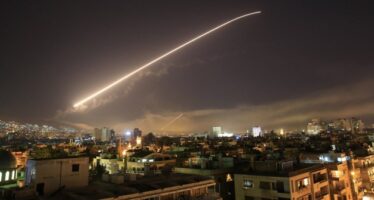Morocco bomb ‘remotely detonated’
![]()
Minister says bomb attack in Marrakesh set off by remote-control device bearing hallmarks of al-Qaeda

Moroccan protesters rally in front of the Argana Cafe in Marrakesh on Friday to denounce terrorism [AFP]
A remote-control device was used to detonate the bomb in Marrakesh that killed at least 16 people, a Moroccan minister has said.
Taeb Cherkaoui, the Moroccan interior minister, said Thursday’s attack bore the signature of al-Qaeda.
“The way in which this act was carried out reminds us of the style normally used by the Al-Qaeda organisation,” he told journalists on Friday.
Cherkaoui said 13 of the 16 people who were killed had been identified as seven French nationals, two Canadians, two Moroccans, a Dutch national and a British national.
However AFP news agency, quoting a medical source, said the 16 comprised eight French nationals, two Canadians, two Moroccans, a British man, a Dutchman, a Swiss man and a Portuguese man.
Moroccan officials have not yet confirmed this.
A report in the Israeli media earlier suggested that a 30-year-old pregnant Israeli woman and her husband, originally from Morocco, had been among the victims.
“Initial inquiries have shown an explosive product made up of nitrate and ammonium and two TATP explosives, and also with nails, and the explosion was set off from a distance,” Cherkaoui told deputies in Rabat earlier.
“Those who are in the habit of opting for this mode of action from a distance are known, which allows us to think that the danger is still present and we have to remain vigilant and prudent.”
In his statement to parliament, Cherkaoui promised the attack would not stop the country’s pursuit of democracy and respect for human rights.
Terror footprint
Triacetone triperoxyde, or TATP, is relatively easy to make and has surfaced in a number of recent investigations into attacks, including the July 2005 London bombings that killed 56 people and injured another 700.
Witnesses said Thursday’s blast went off on the terrace of the Argana cafe, a popular tourist cafe in Jamaa el-Fna, Marrakesh’s main square, wrecking the facade and the first floor.
 A video posted on the internet on April 25 attributed to al-Qaeda included a threat to Morocco [AFP]
A video posted on the internet on April 25 attributed to al-Qaeda included a threat to Morocco [AFP]
John Van Leeuwen, a Dutch tourist, said he had looked the man believed responsible for the attack in the eyes moments before the blast.
“There were only tourists in the cafe, and three other Moroccans, and one guy that didn’t initially look suspicious,” Van Leeuwen told AFP by telephone as he waited, with Marjolein Appel, 39, to catch a flight home.
“But after we found out it wasn’t a gas explosion, my girlfriend and I, we looked at each other, and said that must have been him.
The man had been carrying “two huge bags”, and he thought he had left the cafe shortly after him and his girlfriend, he added.
Police created a photofit image of the alleged bomber based on their description and “it looks as if it’s someone that is familiar to the police”, said Van Leeuwen.
No one has claimed responsibility for the attack. But a video posted on the internet three days before the bombing and attributed to al-Qaeda in the Islamic Maghreb (AQIM) included a threat to Morocco.
It showed five young men, armed and dressed in desert fatigues, their faces covered by the Arab headdress, or shemagh. AQIM has been active in countries in the region, notably carrying out a series of kidnappings for ransom.
On Friday French intelligence and anti-terrorism experts travelled to Marrakesh to help in the probe, a Moroccan official said. International police agency Interpol said it had offered its help.
Britain, France, Germany, Spain, the European Union, the United Nations and the United States have also denounced the bombing, the deadliest in the North African monarchy since 33 people were killed by 12 suicide bombers in Casablanca in 2003.
Morocco depends heavily on tourism, with around 9.4 million tourists visiting the country in 2010, two million of them French.
Related Articles
Dangerous Crossroads in World History: Obama’s New Iran Sanctions: An Act of War
![]()
When the UN refused to agree to the severe sanctions that the U.S. wanted, Obama responded with typical Bush flair
Las reacciones oficiales en América Latina al bombardeo realizado en Siria
![]()
El mismo Secretario de Defensa de Estados Unidos admitió públicamente no contar con ninguna prueba (“evidence”) sobre el evento en Douma del 7 de abril
Ivory Coast violence leaves 18 dead
![]()
Security forces loyal to Ivory Coast’s isolated leader Laurent Gbagbo clash with opposition rebels and protesters Xan Rice in Nairobi



